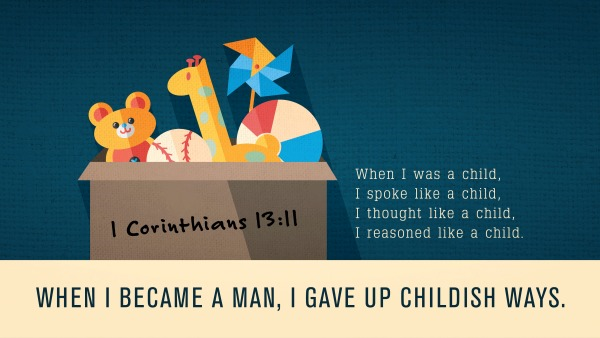1 Corinthians 13 - All About Love |
King James Version |
|||
| 1: Though I speak with the tongues of men and of angels, and have not charity, I am become as sounding brass, or a tinkling cymbal. | |||
| 2: And though I have the gift of prophecy, and understand all mysteries, and all knowledge; and though I have all faith, so that I could remove mountains, and have not charity, I am nothing. | |||
| 3: And though I bestow all my goods to feed the poor, and though I give my body to be burned, and have not charity, it profiteth me nothing. | |||
| 4: Charity suffereth long, and is kind; charity envieth not; charity vaunteth not itself, is not puffed up, | |||
| 5: Doth not behave itself unseemly, seeketh not her own, is not easily provoked, thinketh no evil; | |||
| 6: Rejoiceth not in iniquity, but rejoiceth in the truth; | |||
| 7:Beareth all things, believeth all things, hopeth all things, endureth all things. | |||
| 8: Charity never faileth: but whether there be prophecies, they shall fail; whether there be tongues, they shall cease; whether there be knowledge, it shall vanish away. | |||
| 9: For we know in part, and we prophesy in part. | |||
| 10: But when that which is perfect is come, then that which is in part shall be done away. | |||
| 11: When I was a child, I spake as a child, I understood as a child, I thought as a child: but when I became a man, I put away childish things. | |||
| 12: For now we see through a glass, darkly; but then face to face: now I know in part; but then shall I know even as also I am known. | |||
| 13: And now abideth faith, hope, charity, these three; but the greatest of these is charity. | |||
Video Version
See more videos like this...
Subscribe to our YouTube channel!
 |
|||
All About Love - A Commentary
Faith, hope and charity. These are the cornerstones of the Christian perspective. We have faith in our Creator God and in His free gift of salvation through Jesus Christ. Regardless of our current circumstance we live with hope because, by accepting our salvation, we're assured of eternity in the presence of God. And we have charity - rendered in the King James Version of the Bible from the Greek word, agápē, which means love. We have love. Lots of it. In fact, with God it's all about love. There's really nothing else. He is love. The word agápē describes the love of God for you and me, and our love for Him and each other.
The apostle Paul affirms in the final verse of 1 Corinthians 13 that of faith, hope and love, the greatest of the three is love, and in the preceding 12 verses he gives us some idea as to why.
In verse 1 Paul introduces love as the qualifier of things otherwise thought to be good. As a devout, spirit-filled Christian, Paul not only spoke eloquently in his preaching and writing - the words of men, he most likely exercised the spiritual gift of tongues - the words of angels. In both cases he no doubt excelled as an instrument of God. But he makes it clear that these attributes, sought by many, are worthless when practiced without love. In fact, as valuable as such gifts appear, they have no greater worth than a sounding brass or noisy gong, or clanging cymbal. Suggesting that not only are they worthless without love, they can actually be annoying! Here Paul has introduced us to an important concept by suggesting that the very gifts of the spirit require the catalyst of love to be effective. He reinforces the idea in verses 2 and 3 by adding the gifts of prophecy, discernment and knowledge to the list of Christian characteristics that might be for naught if not for love. Even having the deepest belief in God such that he can move the proverbial mountain by faith, Paul says he's nothing if not motivated by love. Giving to the poor, being burned (perhaps as a demonstration of faith or devotion?) also having no worth if not practiced in love. Interesting.
What does this mean in practical terms? Well, I love my wife and kids and my mom, I'm a nice guy (just ask me), I'm kind to animals and I donate to church and charity. I'm not a hateful person so I guess I have love - as much as the next guy. That's not unusual, most people are nice and have some love in their life. So I suppose everything's alright and we can give Paul a nod for his articulate expression of the concept.
Not so fast. Paul speaks of agápē love. Not romantic love, not brotherly love or love of pizza. He speaks of the love of God in us. The love of God as expressed through us. The love of God through Jesus Christ who lives in us when we surrender to His will. Fortunately, Paul goes on to describe this love so we can recognize it in ourselves and others, and so we can aspire to its ideal.
Verse 4 describes love as patient and kind. Longsuffering. Without envy, arrogance and boasting. We can look to God as the ultimate expression of this. The history of humankind as chronicled in the Old Testament demonstrates the patience of God as He tolerates our shortcomings on the road to our eventual salvation. His kindness is without question. Release from slavery, a parted Red Sea, manna in the wilderness.. And God cannot boast. When He declares His glory it is simply a matter of truth. He envies no human and has no need of arrogance to assert His superiority. We demonstrate God's love as we ourselves learn patience with each other, when we give selflessly to help others or to further God's kingdom. And through frequent prayer and thanksgiving we remind ourselves of our reliance on Him for everything, leaving no room for envy or arrogance. He is our provider and our very maker. Without Him we are nothing, and have nothing.
Verse 5 adds that love isn't rude, doesn't insist on getting its own way and isn't irritable or resentful. If we think about how these attitudes play out in our everyday life, they usually involve selfishness. Rudeness, sometimes expressed as disrespect, vulgarity or insolence, often comes from a desire to put others down which is an ill-disguised technique for building oneself up. It's all about self. Likewise, when we insist on getting our own way we're thinking about our own needs and desires, not those of others. And of course when we become resentful and irritable, easily provoked, typically the result of our not having our own way or having our needs met, we're focusing on self. So the message is clear; when we're looking inward, when we're pursuing own own needs, we're not practicing agápē love. And, as Christians, we're certainly not demonstrating that love. Conversely, when we look to the needs of others, when we do for others without consideration for self, God's love shines through us and our actions take on meaning. This is solid Christian doctrine.
In verse 6 Paul points out that love doesn't celebrate wrongdoing or iniquity. Isn't he stating the obvious? Who would celebrate these things? Well, if you think about how we might react when a celebrity takes a fall by having an extra-marital affair or committing some crime, or perhaps when a famous athlete is caught cheating or doping, sometimes we're inclined to chuckle and talk about how they had it coming. In doing so we're rejoicing in their wrongdoings, their falls from grace. This isn't love. Perhaps we're amused when a less-than-likeable co-worker is reprimanded or fired. Again, not very loving. Our Lord famously suggested that those without sin should cast the first stone; a truth reflected here. And while we might not cheer the actions of ISIS or Al-Qaeda, wrong is wrong and evil is evil no matter how it's manifested in everyday life in seemingly innocuous ways. We don't celebrate that.
Instead, we celebrate truth. God's agápē love within us recognizes truth. And where there is truth we see God's kingdom advanced here on earth, in this broken world, and our love wells up. That warmth we feel when God speaks to us through His word is love celebrating truth. Our feeling of satisfaction when good triumphs over evil is love celebrating truth. And our gratification in winning souls for Jesus Christ is love celebrating truth. Where God is, there is truth.
We've learned that real love, the love from God, involves caring for others rather than ourselves. It's necessary as a qualifier for actions to be truly good, and it impacts our perspectives on iniquity and truth. Clearly, love impacts our lives and those around us, but is it sustainable? Can we keep it up? Yes - in verse 7 we're told that love bears all things, that is, it withstands and endures. It's not easily broken. We're not speaking of human emotion so we can be assured that so long as we're tapped into the love of God, in full communion with Him, our agápē love will not crumble under pressure. Verse 7 adds that our love believes and hopes all things (i.e. without limits), meaning that we see goodness and truth where it exists in people, where falsehood isn't blatantly obvious we give others the benefit of the doubt without suspicion. This loving attitude is a beacon for salvation. A basic niceness that reveals God's love to all who would acknowledge the Source.
Next, having described the power of God's love in us, Paul adds some perspective in light of the greater scheme of things. In reading the remaining verses of 1 Corinthians 13, one gets the sense that our agápē love is not only indispensable for a meaningful life in this world, it is permanent. It never ends. God's love will remain throughout eternity and never lose its purpose. We're given a glimpse of eternity as still involving love, but being of so much more. Verse 8 declares that tongues, knowledge and prophecy will cease. Verses 9 and 10 suggest that being 'in part', these earthly manifestations of the Spirit are but a temporary help, because when perfection is achieved, when Christ's Kingdom is fully implemented, they'll no longer be necessary. In verse 11 Paul compares our sojourn on earth to one's childhood when one is operating with only a partial understanding of what's going on around us or of what is to come. We put aside our childish reasoning as we grow up, replacing it with a more complete understanding of things. So too will we put aside the limited perspective we now hold as we enter into eternity with God. It'll be replaced with a complete understanding of life, the universe and everything! God, His plan, purpose and incomprehensible love will be revealed in all its glory once and for all. And as verse 12 points out, we'll realize that we've been looking at life through a glass, darkly. As though a mere reflection of reality.
In the meantime, we have faith, hope and love to sustain our walk and to further the kingdom of God and, as we've seen, the greatest of these is love.
All About Love - A Commentary, Copyright © 2017 Steve Howells, All Rights Reserved.
Thoughts? Please add a comment...



